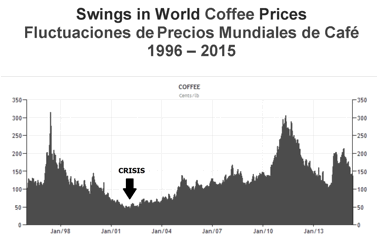
 |
FIGHT FOR COMMUNISM! |
International Communist Workers Party | |
We saw in past columns that Fanon rejected the rule of a “national bourgeoisie” in former colonies. Quite correctly, he saw them as operating as junior partners of imperialism, incapable of developing the productive forces in poor countries in a way that would benefit the masses. Fanon, insisted, however, that newly independent countries must stay in the world capitalist market. The “young independent nation is obliged to keep the economic channels established by the colonial regime. … the basis of its exports remains basically unchanged.” [WE, p.56]
Prisoners of the Market
An unavoidable consequence of Fanon’s idea is that the “young independent nation” he imagines won’t be independent at all! Instead, it must be dominated by world capitalism and subject to its economic laws. These include domination by the banks and by market crises. For example, the fall in the prices in the 1980s of commodities that African countries exported made it impossible for many governments to pay back their loans. The International Monetary Fund bailed many of them out, but imposed conditions that increased their domination by foreign capitalists.
The coffee crisis in the late 1990s and early 2000s was a dramatic example of the effect of the world market. The overproduction of coffee caused a drop in coffee prices by nearly half, producing mass misery—starvation, debts, mass migration—in countries where coffee is produced on small farms. This happened many places in Africa and Latin America, including Cameroon, Central African Republic, Ivory Coast, El Salvador, Ethiopia, Nicaragua, and Mexico (Chiapas). (See graph)

Help From Imperialism?
Fanon thought a “national bourgeoisie” could only do harm, but his view of European capitalists was quite different. He saw them as exploiters, but as energetic, creative and productive, and called on them to help their former colonies.
Fanon said that the colonialists owed it to their former colonies to make up for their centuries of robbery, so they should invest and lend on favorable terms. This was not just a moral obligation, he claimed, but something in the real interests of the imperialist powers. If they did not invest, he said, the European capitalists would lack outlets for their manufactured goods. Circulation of capital would lessen, and economic stagnation would result. [WE, p.60]
If the former colonies joined together and refused to buy from the developed countries, Fanon predicted that factories would close and the European working class would revolt. He called on the European monopolies to “realize that their true interests lie in … massively aiding without too many conditions, the underdeveloped countries.” [WE, p.61]
It is true that capitalists of wealthy countries would not be pleased if former colonies stopped doing business with them. Imperialists need places to sell their products and especially to invest in underdeveloped countries, where the rate of profit is higher because wages are lower. What they don’t need to do and don’t actually do is to invest or lend in order to benefit the masses.
For decades the main foreign investments in Africa have been in extraction of minerals and oil. Lending by foreign banks and institutions has been subject to crippling conditions, like severe limitations on what governments are allowed to spend on public health. This investment has done nothing for the welfare of the masses, who suffer from malnutrition and lack of medical services in many countries that have a lot of oil or minerals.
Fanon imagined that imperialists need to benefit the masses of former colonies or suffer econ-omic stagnation. On his own account, however, the new countries have no choice but to use the same old “economic channels,” staying in the world market and continuing to produce similar products. Thus the former colonists’ only worry is that their former colonies might do business with some other imperial power. The facts bear this out. The old imperialists still dominate many former colonies, although they are now challenged by new imperial powers like India and especially China.
Fanon mistakenly imagined that the end of colonialism would mean that a comparatively harmonious world capitalist system would result. He wrote that the “Third World” of former colonies expects Europe to help “rehabilitate man and ensure his triumph everywhere.” [WE, p. 61]
Fanon’s evaluation of the possibilities of capitalism was fundamentally wrong. Understanding the reasons why it was wrong allows us to draw the fundamental conclusion, that capitalism always means misery for the masses, and communism is the only future for the working class.
Next Column: Fanon on the Psychology of Racism
References: WE = Wretched of the Earth, New York, 2004